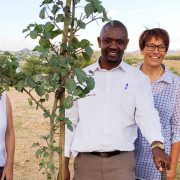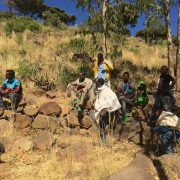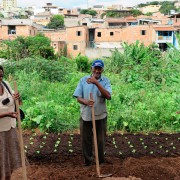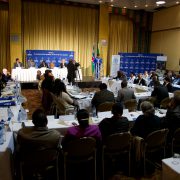First stakeholders’ workshop on “Scaling up Agroecology in the Himalayas”
First stakeholders’ workshop on “Scaling up Agroecology in the Himalayas”
Background
The urgent need to transform our food systems is now widely acknowledged. Climate change, hunger, malnutrition, biodiversity loss and human rights violations are just a few of the challenges that are strongly connected to the way we produce, trade, and consume our food. Agroecology has been globally identified as a key transition pathway that can more holistically address the multifaceted crises we face.
To promote this transition pathway and the food systems approach, IFOAM – Organics International and the World Future Council organized a virtual workshop on “Scaling up agroecology in the Himalayas”. The interactive workshop brought together stakeholders from Bhutan, India and Nepal to discuss the fundamental steps needed to achieve sustainable food systems through agroecology in the Himalayas. Participants exchanged on the current situation of food systems and agroecology in the Himalayas, reflected on the main challenges and opportunities for positive change, explored available policy solutions that support sustainable and healthy agri-food systems, and discussed their potential improvements as well as ideas about additional policy initiatives.
Organizers and supporters
The workshop was organized by the World Future Council and IFOAM-Organics International and was supported by the Deutsche Gesellschaft für Internationale Zusammenarbeit (GIZ) GmbH on behalf of the German Federal Ministry for Economic Cooperation and Development (BMZ)
.
Summary
The lively and engaging two-day workshop took place online on March 14-15, 2023, bringing together 60-70 stakeholders from Bhutan, India and Nepal. Attendees included policymakers, parliamentarians, academia, civil society organizations, private sector representatives and donors.
The first day was dedicated to discussing the main challenges and opportunities of scaling up agroecology in Bhutan, India and Nepal. Sessions were structured around the food systems approach and included an overarching panel discussion and four breakout groups. The breakout sessions covered a range of topics, including resilient, inclusive, and diverse food production systems, sustainability along all food value chains, sustainable and healthy diets, as well as coordination and integration for more policy coherence and consistency.
On the second day, participants built on the discussions from day one and focused on policy dimensions of sustainable food systems, again through panel discussion and breakout groups. They identified and discussed policy solutions that support and hinder sustainable and healthy agri-food systems, discussed policy improvements, exchanged on existing policy gaps and reflected on how policy coherence and consistency could be improved.
Why was this event held? What was the aim? Over the last 10 years, Bhutanese, Indian and Nepalese policymakers have increasingly recognized the need for transition towards sustainable agricultural systems to preserve their natural resources and improve livelihoods for their rural populations. Political commitment has been implemented with varying degrees of intensity, including policies and programs with specific budget earmarks for measures supporting organic farming and agroecology. Recently also other parts of food systems, such as value chains and markets, have received more attention from policymakers. To build on this momentum and to explore how to better scale up agroecological food systems, we organized this two-day interactive stakeholder workshop. The event brought together food system stakeholders from diverse backgrounds, who share a common understanding of the need for change. We created a platform, through which we can collaborate and find innovative solutions to accelerate the transition towards more sustainable food systems based on agroecology. The workshop is part of the project “Scaling up Agroecology in the Himalayas”, which aims to draft a common roadmap and which builds on the digital event “Scaling up Agroecology in the Himalayas Together” held in April 2021 (More information at: https://www.ifoam.bio/news/high-level-policy-experts-discussed-current-situation) as well as on the study “The Mainstreaming of Organic Agriculture And Agroecology in the Himalaya Region” (Available at: https://old.worldfuturecouncil.org/the-mainstreaming-of-organic-agriculture-and-agroecology/). Will there be more such events to come in the future? This workshop is just the first in a series of stakeholder events that will conclude by the end of 2023 with a common roadmap. By scaling up agroecology in the Himalayas, we can create a blueprint for sustainable food systems that can be replicated in other regions around the world. Moreover, this is a crucial step towards ensuring our common future on this planet, acting upon the fact that the health of our ecosystems and the well-being of all living beings are intimately interconnected.
Major takeaways


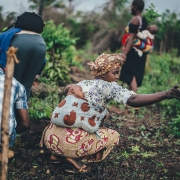
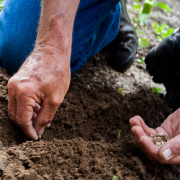
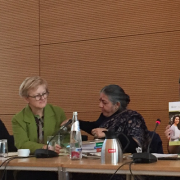
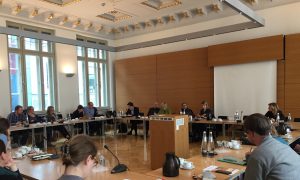 In a simple yet elegant conference room, the Honourable Künast welcomed her guests and 30 audience members from the German Parliament, European environmental institutes and the general public, and opened the discussion. The conversation quickly turned to agriculture in India. As a country whose agricultural face was profoundly transformed under the Green Revolution of the mid-20th Century, India is a notable example of the extreme conflicts and contrasts in the current global food system. Councillor Shiva described the horrors incurred by input-intensive agriculture in the country, which she has repeatedly encountered across four decades of environmental activism. An ongoing suicide-epidemic of hundreds of thousands of debt-ridden farmers, a ‘cancer train’, from the Punjab the Rajasthan, and a youth driven from agriculture and into drug abuse were some of the images she invoked. But the old techniques based on an old reductionist “lego-logic” have been recognised and, by some, reversed in the most radical and inspiring ways.
In a simple yet elegant conference room, the Honourable Künast welcomed her guests and 30 audience members from the German Parliament, European environmental institutes and the general public, and opened the discussion. The conversation quickly turned to agriculture in India. As a country whose agricultural face was profoundly transformed under the Green Revolution of the mid-20th Century, India is a notable example of the extreme conflicts and contrasts in the current global food system. Councillor Shiva described the horrors incurred by input-intensive agriculture in the country, which she has repeatedly encountered across four decades of environmental activism. An ongoing suicide-epidemic of hundreds of thousands of debt-ridden farmers, a ‘cancer train’, from the Punjab the Rajasthan, and a youth driven from agriculture and into drug abuse were some of the images she invoked. But the old techniques based on an old reductionist “lego-logic” have been recognised and, by some, reversed in the most radical and inspiring ways.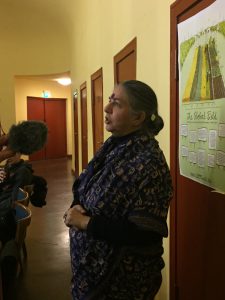 The Director of the World Future Council Alexandra Wandel mentioned that unfortunately not a single German law was nominated for the Future Policy Award on Scaling Up Agroecology and that parliamentarians were invited to have a look at the awarded policies, including the organic policy of Sikkim and also the silver award from neighbouring country Denmark which received the Future Policy Silver Award and has the highest share of organic products in the world.
The Director of the World Future Council Alexandra Wandel mentioned that unfortunately not a single German law was nominated for the Future Policy Award on Scaling Up Agroecology and that parliamentarians were invited to have a look at the awarded policies, including the organic policy of Sikkim and also the silver award from neighbouring country Denmark which received the Future Policy Silver Award and has the highest share of organic products in the world.